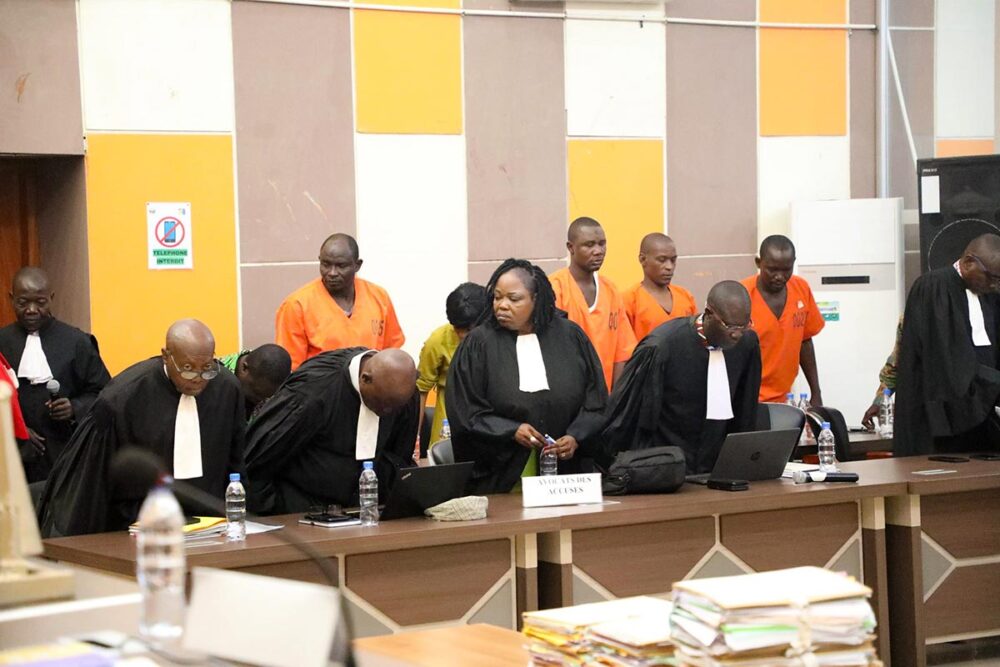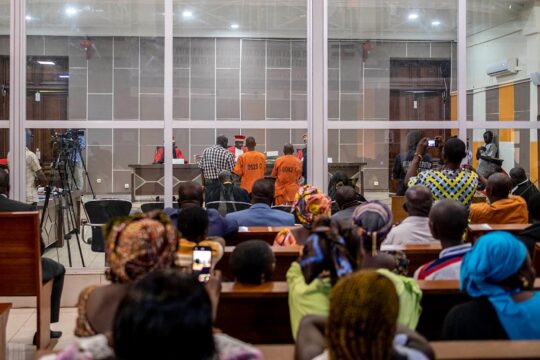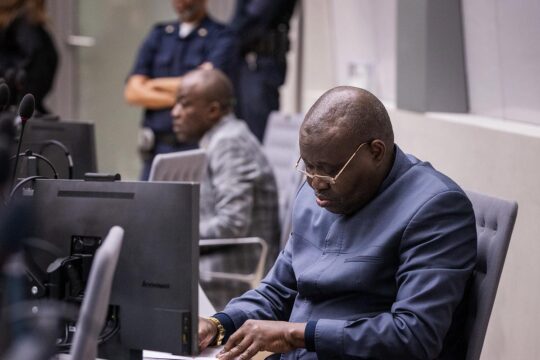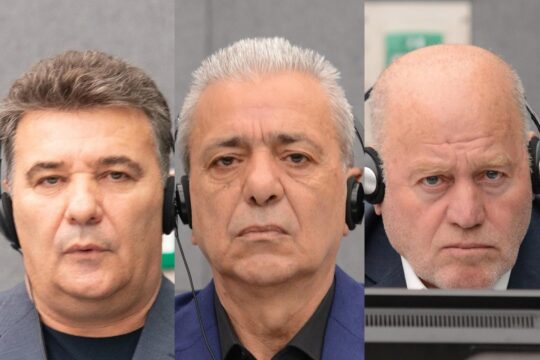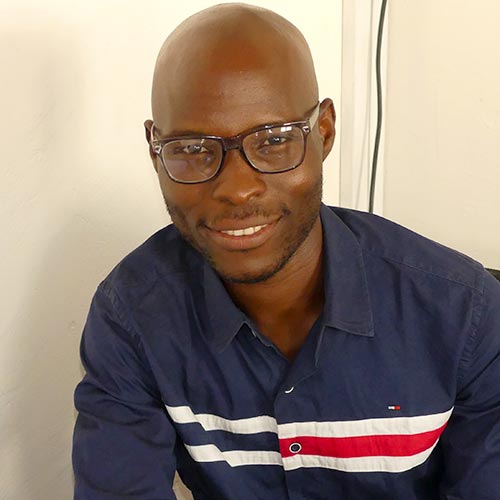When the trial opened on December 5, 2023, only three of the ten défendants prosecuted in this case by the Special Criminal Court (CPS) were present. Another accused was found a week later, after an ultimatum from the CPS. Since then, these four defendants - Azor Kalite, Charfadine Moussa, Antar Hamat and Oscar Wordjonodroba - have appeared before the Court to answer charges of war crimes and crimes against humanity.
The events in Ndélé are characterized by inter-community conflicts between Goula and Rounga factions of the Popular Front for the Rebirth of the Central African Republic (Front populaire pour la renaissance de la Centrafrique - FPRC). These two ethnic groups - the majority Goula claiming to be the “masters” of the minority Rounga - joined forces within the Séléka rebellion to seize power in 2013. After 10 months of murderous rule, the Séléka was pushed out, but as disarmament and reconciliation processes had yet to start, the atrocities ontinued.
Mining, racketing at roadblocks and securing transhumance for money had become sources of income for the rebel groups, which delayed the disarmament process. The desire to control more space and more road barriers created a gap between the two ethnic groups. Their dominant-dominated relationship, which had been abandoned in favour of union within the Séléka, was to resurface. The atrocities, in particular the targeted assassinations of members of one group and the reprisals that followed, created a split between the two ethnic groups, particularly among members of the FPRC, a rebellion whose strongholds include Ndélé in Bamingui-Bangoran, Bria in Haute Kotto and Birao in Vakaga.
Three deadly attacks and more than 80 dead
As part of this first part of the trial into the events in Ndélé, the special prosecutor’s office stated that there had been a total of three clashes in the town of Ndélé and the surrounding areas on 6 March, March 11 and April 29, 2020. According to the prosecution, the two factions of the FPRC, Goula and Rounga, clashed in urban areas.
These attacks and reprisals caused collateral damage: at least 15 civilians were killed during the first attack, attributed to the Rounga faction, and around thirty houses were burnt down. The death toll was higher during the second confrontation, again triggered by the Rounga faction, according to witness statements collected by the public prosecutor's office: 37 civilians were killed and around a hundred houses burnt down, while residents were forced to flee the area. The third attack, described as a Goula reprisal, was just as deadly, with 29 people killed and around a hundred houses and businesses burnt down. As the public prosecutor’s office continues to register civil parties, the number of victims could be revised upwards.
The main accused is Azor Kalite, arrested in May 2020 by the forces of Minusca, the United Nations mission in the Central African Republic. As perpetrator, co-perpetrator, accomplice and military commander, he is accused of having committed crimes against humanity (murder, inhuman acts, persecution) in the town of Ndelé on April 29, 2020. The three other detainees, Charfadine Moussa, Antar Hamat and Oumar Oscar Wodjonodragba, are accused of the same acts. Among the war crimes listed, the indictment mentions intentional homicide, attacks on the health and physical or mental well-being of persons, in particular cruel treatment such as torture, mutilation or any form of corporal punishment, attacks on the civilian population of Ndélé and pillaging.
On 16 April, after more than two months’ suspension due to a strike by Central African lawyers protesting against the arrest of one of their own, the CPS resumed hearings in the so-called Ndélé 1 case. On the agenda were the reading of the minutes of the absent witnesses and the hearing of two members of the government as witnesses: Herbert Gontran Djono Ahaba, Minister of Transport and former leader of the rebel movement Rassemblement patriotique pour le renouveau de la Centrafrique (RPRC), and Gilbert Toumou Deya, deputy Minister in charge of Disarmament and leader of the rebel group Mouvement des libérateurs centrafricains pour la justice (MLCJ). Abdoulaye Issène, the chief of staff of the FPRC, detained in connection with the Ndélé 2 case, which is still under investigation, was also due to be heard.
Absent witnesses and material evidence
The judges read the minutes of about ten witnesses. According to some, there had been three attacks, according to others six, including three carried out by the Goula and three by the Rounga and their allies.
As for the perpetrators of the attacks, several names appeared in the witness statements presented by the prosecution. Witness No. 32 stated that Kalite was the leader of the Goula, that he had not taken part in the first two battles on March 6 and March 11, 2020, but that he had organised and taken part in the last attack on April 29, 2020. Witness No. 36 said that the Rounga faction of the FPRC was led by three men, Abdel Aziz, Abakar Bélé and Assane, the FPRC Chief of Staff in Ndélé. On the Goula side, he mentioned Ataïr Idriss, Lolo, Ramadan and General Facher. The latter was prosecuted, but did not take the stand.
Witness No. 41, who stated that he had participated in the burial of 29 bodies in a mass grave, named Youssouf, the former FPRC commander in Ndélé, as the leader of the attack on March 6, 2020.
The defendants wished to cross-examine the absent witnesses, whose statements had been read to them, but the court stated that they could not be found at the moment... This prompted a reaction from the defence, which believes the accused have the right to question those who testify against them. These witnesses are no longer at the same addresses and “some of them have even died”, said Alain Tolmo, first national deputy of the special prosecutor. The prosecution emphasised that the option of reading the minutes of absent witnesses was taken at the pre-trial hearing.
Aside these testimonies, the prosecutor’s office presented several exhibits, some collected at the crime scenes, others seized after the suspects were arrested. The Minusca forensic police found seven weapons of war, ammunition, bullet cases, mobile phones, a Thuraya satellite phone, a radio receiver, banknotes, a report card, a birth certificate, photo cards, knives of various brands, and packaged tablets (including Valium and Tramadol, according to the prosecution).
In addition, there were photographs of lifeless bodies taken just after the massacres, images of the ruins of burnt-out houses, mass graves and victims’ graves. The prosecution also projected images of the defendants filmed during meetings where the peace agreements were signed. The defence did not wish to comment on the presentation of these exhibits.
Issène’s silence and Kalite’s story
Arrested last September in connection with the so-called ‘Ndélé 2’ case, Abdoulaye Issène, the FPRC’s military leader, has been called several times by witnesses and defendants in the Ndélé 1 trial. The court therefore decided to call him to the stand. After three refusals to appear before the judges, Issène finally did so on April 29, 2020. From the outset, the judges asked Issène to explain what he knew about the case. “I am a son of Ndélé, but I was not in Ndélé at the time of this event. I’ve been in Bangui since 2016. So I cannot give you any clarification on an incident that occurred in my absence,” he said, according to a report broadcast on Radio Ndeke Luka, before adding: “I hold state secrets. I cannot be questioned like that in public.” And despite the president of the Court’s insistence, he would not say another word. After a recess requested by his lawyer, Issène chose to remain silent. “I cannot testify against people with whom I sleep and eat,” he said. As for the two members of the government who had been announced as witnesses, they did not turn up to testify, which was deplored by all the parties to the trial.
On 6 May, the judges began questioning the defendants. Azor Kalite was the first to take the stand. In his orange prison uniform numbered ‘0001C’, with an interpreter at his side, Kalite appeared serene. He contemplated and touched his toes during the questions and stared at the judges when he answered. From the outset, he indicated that he had not signed the minutes of his hearing conducted by Minusca judicial police officers. The issue led to a lengthy debate, but did not prevent the progress of the questioning. Kalite, who spoke in French, initially denied having been a member of an armed group and claimed to have been sent to ‘supply’ the population in difficulty in the absence of a humanitarian corridor, in the aftermath of the attacks on March 11, 2020. “At the time of the events, I was the regional coordinator of the disarmament operation under the February 6, 2019 agreement between the government and the armed groups,” he claimed. “You can only take part in disarmament if you are a member of an armed group,” replied back the deputy special prosecutor, Romaric Kpangba. “I was not in Ndélé during these murderous events,” Kalite said. But the prosecution produced a telephone boundary map showing that the accused was in the vicinity of Ndélé during the attack on April 29, 2020. However, for Fleury Hotto, Charfadine Moussa’s lawyer, there is a difference between the statement obtained by requisition from the telephone operator and the expert report ordered by the investigating magistrate’s office.
Continuing his explanation, Kalite said that it all began on July 14, 2019 during a routine check on a roadblock at Amdafock, in the Vakaga, by a faction of the FPRC Rounga on an individual of Kara ethnicity. During this check, he said, a batch of hunting cartridges was found and confiscated by the FPRC Rounga. When negotiations to give back the cartridges failed, ethnic conflicts resurfaced between the Rounga and their Sara allies on one side, and the Kara and Goula on the other side. Fighting in the villages of Amdafock and Terfel on August 29, 2019 left several attackers dead.
Kalite also talked about several attacks suffered by his Goula community. In particular, he mentioned the Nzako attack on the Goula community under the command of Mahamat Sallet. According to him, Sallet took hostage and raped his nieces, 16-year-old twins, and kidnapped several women from the Goula community in the town of Nzako to use them as sex objects for his men.
Abdoulaye Issène, the “alpha and omega” of the Ndélé attacks?
Kalite also mentioned an attack on Goula villages by Sudanese Arabs. “I was on my way to Ndifa to mourn my older brother who died after being shot in the attack. When I arrived in Ndifa, the town was besieged by Sudanese Arabs, assisted by Rounga who were demanding the sum of 120 million CFA francs [180,000 euros] in compensation for their nationals murdered in the Goula villages,” he recalled. “In view of the various problems the Goula community faced, a meeting was called to discuss them in Tiringoulou. It was at this meeting that I was appointed to go to Ndélé and meet the authorities to ask the fighters to cease hostilities,” he continued. “When I arrived, the authorities were absent and the Minusca would not listen to me or hear from me. When my mission failed, I decided to turn back, and that’s when I was arrested by a contingent of the Minusca, then brought back to Bangui after interrogation, where I’ve been held for four years.”
When asked about the nature of his relationship with FPRC leader Abdoulaye Issène, Kalite replied: “He is the alpha and omega of everything that happened in Ndélé.” The accused claimed that he has never returned to the town of Ndélé because of Issène who, according to him, is responsible for eleven attacks in Birao and is at the heart of the crisis in Ndélé. “I’m in the process of serving four years in prison, while the real culprits are there, in Ndélé, and come to Bangui from time to time,” he concluded. “And finally, I didn’t need to come all the way to Ndélé to kill the Rounga. I crossed villages and, on the road, I was caming across Rounga and Sara people. In my own house, there are at least three Rounga in my charge whom I have not killed.”
Antar Hamat’s weapon
In the same vein as Kalite, Antar Hamat recounted that he came to Ndiffa for his uncle’s funeral and it was during this trip that the events in Ndélé took place. He said that he had been chosen to bring food to the family, which had been affected by the violence in Ndélé. “We left Ndélé for Ouadda with my co-defendants on May 19, 2020. On the way, we came across Minusca units with 14 vehicles. They stopped us, handcuffed us and blindfolded us,” he said. “The next day, they called me to go and sign a paper, which I did."
Hamat explained that there were five of them who set off from Tiringoulou, each on a motorbike, and that he was the only one armed. The accused stated that he had learnt to handle weapons on the job, and that he had obtained the weapon in Tiringoulou for his own safety. “However, in the official report, you said that you obtained the weapon in Bria?,” asked the deputy prosecutor, Tolmo. Hamat’s lawyer, Claudine Bagaza, retorted that her client “had already admitted to being armed because of the insecurity in the region.” “All the witnesses agree that the entire population is armed in this area,” she said.
The other two defendants are awaiting questioning. They are due to be followed by closing arguments. Before it was delayed by the lawyers’ strike, this first trial on the events in Ndélé was due to last 45 days. It is now likely to last longer than expected. Created in 2015 with the support of the UN, the CPS began its first investigations in 2018 and a first trial was held in 2022 to try three members of the armed group 3R (Return, Reclamation and Rehabilitation), who were found guilty of crimes committed in the villages of Koundjili and Lemouna, in the north-west of the country, on May 21, 2019.


